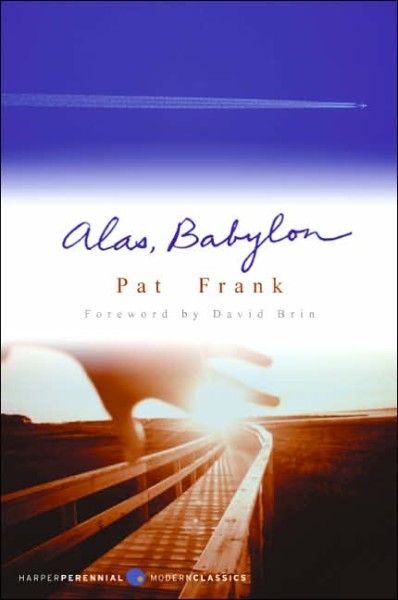Book Review: Pat Frank’s “Alas, Babylon”
by Miles Raymer
Given the recent popularity of post-apocalyptic narratives, it seems a good time to pick up Pat Frank’s Alas, Babylon. Frank’s portrait of a small Florida community coping with nuclear fallout is an early contribution to the genre, one that demonstrates considerable cleverness and technical merit. Sadly, this story of Cold War-era anxiety and ingenuity has not aged well. Despite a clear understanding of what it might take to survive a nuclear holocaust, Frank exhibits minimal insight about the nature of human conflict or the stilted belief systems that bring about catastrophe. Alas, Babylon is more of a relic than anything else––good for examining the calcified viewpoints of the past, but of little use for those looking to the future.
The best features of this novel are Frank’s simple writing style and his depictions of the social and economic relationships between small town Americans. When nuclear war between the US and Russia begins in the wake of a military misunderstanding, the citizens of Fort Repose, Florida find themselves cut off from national and state support systems––food, water, electricity, gas, and communications. Led by likable but static protagonist Randy Bragg, a hodgepodge family forms in the interest of shared survival. After some weeks of intense but predictable horror, the group manages to begin eking out a meager but adequate living. They appropriate necessities such as salt, learn to hunt game, and trade with other surviving locals. Their lifestyle is a mixture of old-timey values and hard truths, where decency persists to a point but doesn’t always win the day.
Despite its imaginative and somewhat realistic view of the technical problems faced by people dealing with nuclear fallout, Alas, Babylon fails to offer much practical reflection about the habitual behaviors and human shortcomings that cause conflict. Though they become proficient at dealing with obstacles of the moment, Frank’s characters rarely think beyond their immediate environment to scrutinize the greater flaws in their worldviews. Such myopia might be realistic, but doesn’t leave room for the kind of reconstructive character development often found in good post-apocalyptic stories. A lot changes in Alas, Babylon, but surprisingly much stays the same.
Frank’s biggest misstep is his under-utilization of the novel’s two most interesting characters: Peyton and Ben. These are the pre-adolescent children of a dead war commander (Randy’s brother) and his wife Helen. Early in the novel, Helen remarks that her children are better than adults at dealing with the emotional trauma of nuclear war. This is because they’ve always lived under threat of catastrophe and know no other way to conceptualize the world. Unlike their adult caretakers, these young ones do not long for “normalcy” or the “good old days.” Ben especially exhibits a keen sense of pragmatism and willingness to take on adult responsibility. This gave me the impression that Alas, Babylon would be a loss of innocence tale in reverse, with adults realizing their own infantile complacency in contrast to the resourcefulness and plasticity of younger minds. This would have provided a platform for Frank to demonstrate the difference between pre-war and postwar values, clearing out old biases and making way for progress. But with the exception of Randy’s humane attitude toward blacks (which was probably quite controversial at the time of publication), Frank seems convinced that a stripped down version of the status quo would be enough to see people through tough times. The clever children end up playing second fiddle to more conventional plot tropes: resource shortages, romances, and hostile highwaymen who need to be unceremoniously put down.
Alas, Babylon is the product of an era now bemoaned for its intolerance and lack of eclecticism, so it’s no surprise that my complaints are tainted by my contemporary perspective. I’ve no doubt that Pat Frank wrote the book in good conscience, and that he was probably something of a progressive in his day. But looking back, it’s not much fun to be reminded of a time when heroic Southern gentlemen could make it through the end of the world and still have thoughts like this: “The more he learned about women the more there was to learn except that he had learned this: they needed a man around” (299). Instead of addressing the dangers of powerful weaponry and petty tribalism, Frank is content to assure readers that enough decency has been retained to leave room for male chauvinism.
The resounding message here is that the strategies and values for respectable survival are already right in front of us, and don’t require any serious shakeup of customs or institutions. From beneath the shadow of today’s apocalyptic fears about climate change––a problem demanding substantial and radical change––this attitude is neither useful nor desirable. It may have been good enough for citizens quaking at the thought of Cold War commies riding nukes into a mushroom-clouded sunset, but it’s far from satisfactory more than 50 years on.
Rating: 4/10

[…] http://www.words-and-dirt.com/words/book-review-pat-franks-alas-babylon/ […]